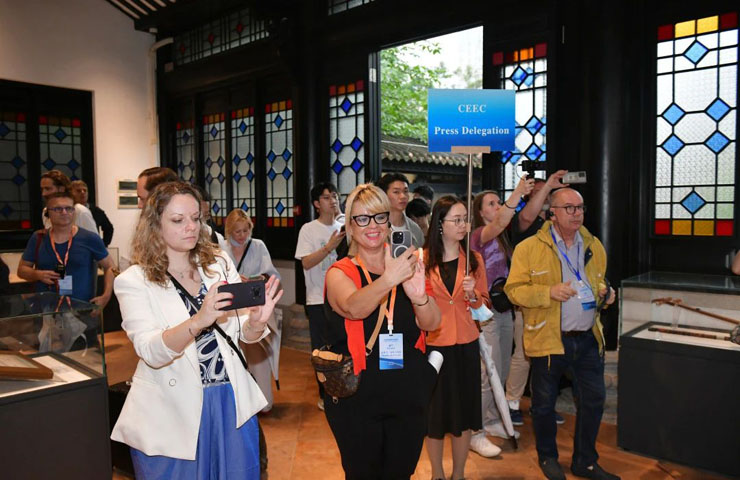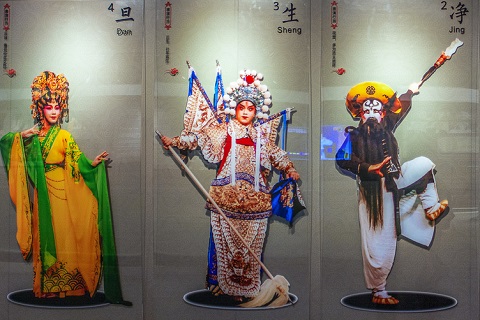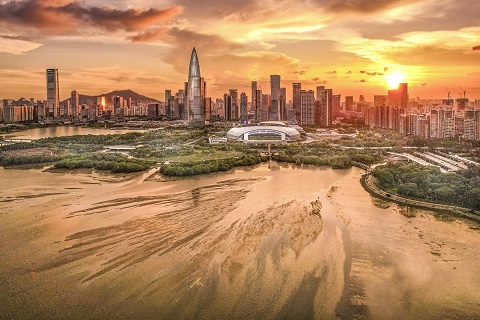Guangzhou, place for travel, business, and living

1. Basic Information
As the capital of Guangdong province, Guangzhou sits at the lower reaches of the Pearl River in the province's south-central region. The sprawling metropolis spans an area of 7,434.4 sq km and serves as the political and cultural center of Guangdong. North of both the Hong Kong and Macao special administrative regions, Guangzhou's location in the Pearl River Delta has long secured the city's position as the leading entry and exit shipping port of Chinese mainland, earning the city the title of China's "Southern Gateway".
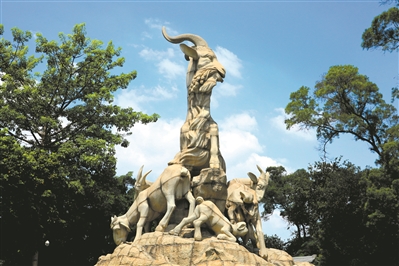
Guangzhou’s iconic Five-Ram Statue. [Photo/gz.gov.cn]
Located in the South Asia Tropical Zone and nestled between both mountains and sea, Guangzhou experiences a typical monsoon-marine climate with warm temperatures, ample rain, low temperature differentials, extended summers and a short frost period. Winters in the city are cold and dry, while summers are wet with high temperatures and a high humidity index.
The city's immensely developed infrastructure has made Guangzhou an important travel hub in the mainland. The Beijing-Guangzhou, Guangzhou-Shenzhen, Guangzhou-Maoming and Guangzhou-Meizhou-Shantou railway systems offer high-speed rail services capable of reaching all major cities across the whole of China in one day or less.
As one of the most developed industrial centers in China, Guangzhou is a mass distribution hub for both foreign and domestic goods.
In 2018, more than 480,000 planes landed at or departed from Guangzhou Baiyun International Airport, up 2.6 percent year on year. The airport hosted 70 million passengers and processed 1.9 million tons of mail goods, both of which saw an increase of 6 percent. From January to November, Guangzhou Port handled 570 million tons of cargo and 20 million TEUs, climbing by 5.2 percent and 7.5 percent, respectively, over the previous year.
In 2018, Guangzhou's GDP reached 2.3 trillion yuan ($343 billion), an increase of 6.2 percent over 2017. By the end of the year, 301 Fortune Global 500 companies had launched 1,017 projects in Guangzhou.
2. Administrative Districts and Population
At the end of 2018, Guangzhou housed a diverse population of 14,904,400 people across its 11 districts.
Guangzhou is well-known for its highly livable environment, topping the people's livelihood development index in China for two consecutive years.
Districts of Guangzhou:
Yuexiu, Liwan, Haizhu, Tianhe, Baiyun, Huangpu, Huadu, Panyu, Nansha, Conghua and Zengcheng.
3. History
With a rich history of over 2,230 years, Guangzhou has been awarded State Council recognition as a National Famous Historic and Cultural City. Under the reign of Emperor Qinshihuang in 214 BC, the State of Qin conquered the region of Lingnan. The construction of Panyu Town soon followed under the order of Nanhai Governor Ren Xiao. That town, commonly referred to as Ren Xiao town, is the first origins of what would later become a prosperous grand harbor of the Maritime Silk Road and the thriving metropolis of modern-day Guangzhou.
An ancient legend tells of five celestial beings descending upon Guangzhou riding five rams of differing colors. In the mouths of the rams were sheaves of rice. It is said the celestial beings bestowed the sheaves of rice to the people of Guangzhou so that the city would be forever free from famine. A sculpture of five rams currently stands in the city's Yuexiu Park, and along with this legend has earned Guangzhou the nickname "The City of Rams".
4. Foreign Relations
Hailed as the "Pearl on the Tropic of Cancer", Guangzhou is a hub connecting the Chinese mainland with the rest of the world. The city maintains trade links with more than 220 countries and regions around the globe. Guangzhou's Baiyun International Airport services 136 shipping routes across five continents on a daily basis. Guangzhou Port has opened 150 container shipment routes, trading with over 400 ports in more than 100 countries and regions worldwide, making the city a veritable beacon of open market trade on the 21st Century Maritime Silk Road.
Guangzhou housed 63 foreign consulate generals as of Oct 26, 2018, and has also established sister city relations with 38 international cities: Fukuoka (Japan), Los Angeles (US), Manila (the Philippines), Vancouver (Canada), Sydney (Australia), Bari (Italy), Lyon (France), Frankfurt (Germany), Auckland (New Zealand), Gwangju (Republic of Korea), Liknoping (Sweden), Durban (South Africa), Bristol (Britain), Yekaterinburg (Russia), Arequipa (Peru), Surabaya (Indonesia), Vilnius (Lithuania), Birmingham (Britain), Hambantota (Sri Lanka), Recife (Brazil), Tampere (Finland), Bankok (Thailand), Buenos Aires (Argentina), Dubai (the United Arab Emirates), Kuwait City (Kuwait), Kazan (Russia), Istanbul (Turkey), Harare (Zimbabwe), San Jose (Costa Rica), Noboribetsu (Japan), Valencia (Spain), Rabat (Morocco), Lodz (Poland), Ahmedabad (India), Pokhara (Nepal), Quito (Ecuador), Santiago (Chile) and Mombasa County( Kenya).
5. Economy
In 2018, Guangzhou's GDP reached 2.3 trillion yuan, an increase of 6.2 percent over 2017. The added value of the primary industry was 22.3 billion yuan, an increase of 2.5 percent year on year; that of the secondary industry was 623.4 billion yuan, an increase of 5.4 percent; and that of the tertiary industry was 1.64 trillion yuan, an increase of 6.6 percent.
6. Tourism
In 2018, Guangzhou hosted over 223 million tourists, an increase of 9.2 percent over 2017. Tourism revenue hit 400.8 billion yuan in 2018, up 10.9 percent year on year.
Guangzhou is currently home to 53 A-level tourism attractions, including two national 5A-level ones and 26 national 4A-level ones. There are 713 travel agencies across the city and 170 star hotels (22 five-star hotels and 35 four-star ones).
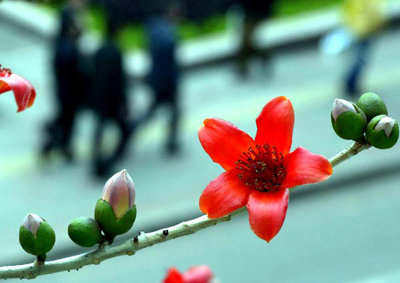
The city flower of Guangzhou. [Photo/gz.gov.cn]
7. Public Services
Most foreign-related government agencies in Guangzhou are able to handle information requests, complaints and formalities in English. The majority of major government agencies also maintain bilingual Chinese and English websites offering information on policies, rules, guidelines, business registration, taxation and other related procedures online.
Government offices are open from Monday to Friday (excluding statutory public holidays) from 8:30 am to noon, and from 2 pm to 5.30 pm. Appointments can be made in advance for individuals requiring government services during public holidays.
8. Food
As one of the Eight Culinary Traditions of Chinese Cuisine, Cantonese cuisine is characterized by its great diversity of ingredients, elaborate preparation and strong emphasis on texture, aroma and taste. Soups, tea, dim sum and midnight snacks are a large part of the local culinary culture.
The city is home to numerous century-old restaurants providing Cantonese and Chaozhou style dishes. Culinary styles from other regions of China, such as Hunan, Sichuan, Shandong and Huaiyang, can also be readily found throughout Guangzhou. Western-style restaurants, coffee houses and fast food outlets are also plentiful in the city.
Due to its subtropical climate, Guangzhou is capable of producing fruit year round. Litchi, bananas, pawpaw and pineapple have been deemed the "Top Four Fruits of Lingnan", however, mango, starfruit, longan, jackfruit and watermelon are also immensely popular among the locals.
9. Shopping and Recreation
Considered a shopper's paradise, almost everything from luxury items of leading international brands to low-priced daily necessities can be easily found in Guangzhou. The city houses numerous wholesale markets which trade and distribute foreign and domestic goods. Tee Mall, Grandview Mall and major tourist attractions throughout the city offer fabulous souvenirs for travelers.
A wealth of recreational activities can be experienced in Guangzhou. Classical Chinese and modern international performances are regularly staged at the Guangzhou Opera House, Xinghai Concert Hall, the Friendship Theater and the Sun Yat-sen Memorial. Art exhibitions are also regularly on display at the Guangzhou Art Gallery, the Guangzhou Museum of Art, the Guangzhou Library and the Guangdong Museum of Art.
Chimelong Paradise, Xiangjiang Safari Park, the Guangzhou Zoo and the Baiyun Mountain Scenic Area offer stunning natural environments for leisure and relation away from the hustle and bustle of Guangzhou’s busy streets. Luhu Golf Course, tennis and badminton on Shamian and Ersha Islands, numerous yoga clubs and the Total Fitness Club offer visitors many delightful ways to unwind and get some physical exercise.
Guangzhou's nightlife offers many options for locals and visitors alike. Night cruises on the Pearl River, films at the Warner Jinyi Cinema and singing with friends in KTV parlors are just some of the ways to pass the evening hours in the city. Guangzhou also has a number of themed bars located on Fangcun bar street, Huanshi Road and the Pearl River Pati bar street.
For the latest information regarding government policies and local public services please visit: www.eguangzhou.gov.cn.
Foreign Affairs Office of Guangzhou Municipal People's Government
Address: Bldg 3, No 1 Fuqian Road, Guangzhou
Tel: 8620-83125513
Copyright © Foreign Affairs Office of Guangzhou Municipal Government,
Hong Kong and Macao Affairs Office of Guangzhou Municipal Government All rights reserved.
Presented by China Daily.
京ICP备13028878号-28





